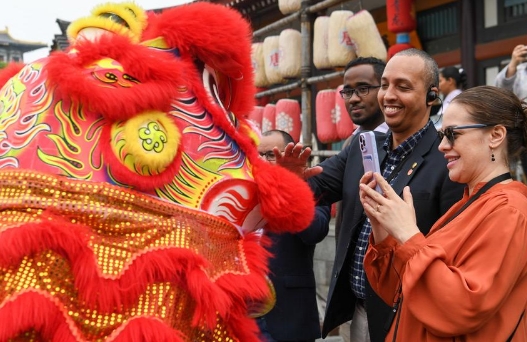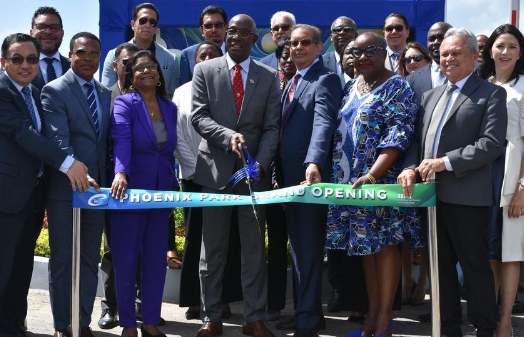China and Latin America share vision for global human rights governance

Members of a delegation of diplomatic envoys, agency representatives and journalists from Latin American and Caribbean countries visit an ancient town in Xiangyang, central China's Hubei Province, April 22, 2024. (Xinhua/Du Zixuan)
The right to development is an inalienable basic human right, and all countries should follow the path of human rights development suitable for their own national conditions.
Senior officials, experts and scholars in the field of human rights from China and countries in Latin America and the Caribbean (LAC) exchanged their views on respecting and protecting human rights during the first China-Latin America human rights roundtable held here on Tuesday.
In a world often dominated by Western narratives on human rights, the participants called for something fundamentally different: human rights cannot be governed by one-size-fits-all models, dictated by Western countries.
Instead, the world needs a more cooperative approach, and the Global South should raise its voice and contribute to the reshaping of global human rights governance.
The underlying message from the roundtable was clear: the right to development is an inalienable basic human right, and all countries should follow the path of human rights development suitable for their own national conditions.
As the world's largest developing country and one of the regions with the most Global South countries, China and LAC share similarities in histories, ideas, goals and paths in human rights development. Both regions have experienced colonialism, grappled with inequality, and are now working to raise living standards for millions.
Since the reform and opening-up in the late 1970s, 770 million rural people in China have been lifted out of poverty, accounting for more than 70 percent of the global poverty-alleviated population in the same period. At the roundtable, China's success was highlighted as an example for other developing nations, including those in Latin America.
LAC countries are also actively exploring development models suited to their own conditions, especially focusing on ensuring people's livelihood, promoting social equity and raising the living standards of low-income groups. The countries have made important achievements in maintaining stability, revitalizing the economy and improving people's livelihoods.
As Gustavo Pacheco Villar, president of the Andean Parliament said, both China and LAC countries have made great contributions to the cause of human rights, adding that China's practice of human rights protection can provide a new path for the world, including LAC countries.
Over the years, China and LAC countries have worked together for common development on the basis of high-quality Belt and Road cooperation to benefit people's livelihood.
A series of China-LAC cooperation projects, including the Phoenix Park Industrial Estate in Trinidad and Tobago, has promoted local economic and social development, ensured and improved living standards through development, and constantly consolidated the foundation of human rights progress, to better protect and promote human rights.

Trinidad and Tobago's Prime Minister Keith Rowley (4th L, front), Foreign Minister Amery Browne (2nd L, front), Minister of Trade and Industry Paula Gopee-Scoon (3rd L, front), Chinese Ambassador to Trinidad and Tobago Fang Qiu (1st L, front) and other officials attend the launch ceremony of the Phoenix Park Industrial Estate in Point Lisas, the second-largest port in Trinidad and Tobago, Jan. 10, 2024. (Xinhua/Zhu Wanjun)
In recent years, China and LAC countries have also actively spoken out for Global South countries, advocating that global human rights governance should be more equitable, just, reasonable and inclusive. Both sides oppose the use of human rights as a tool of unilateralism and hegemony, while supporting the United Nations (UN) human rights bodies in performing their duties in a fair and objective manner.
This shared stance reflects a broader commitment to multilateralism and the principle of national sovereignty, emphasizing that human rights should not be politicized or used to interfere in the internal affairs of other countries.
China's Belt and Road Initiative, which has extended across the Global South, not only fosters economic growth but also addresses fundamental human rights such as access to infrastructure, healthcare, and education.
The discussion at the roundtable made clear that such projects are seen as integral to building the foundation for a more inclusive human rights model, one that can uplift entire populations by creating conditions conducive to progress.
China's Global Development Initiative, Global Security Initiative, and Global Civilization Initiative, widely endorsed at the roundtable, also represent a reimagining of how human rights, security, and development intersect.
By fostering cooperation on specific projects -- rather than relying on abstract moral judgments -- China and LAC countries are jointly advocating a model of human rights development rooted in real-world concerns like social inclusion and sustainability.
China-LAC cooperation on human rights development is an important part of South-South cooperation. In a world facing complex global challenges, the shared vision of China and LAC provide a meaningful contribution to the broader discourse on development and human rights.
Editor:伏娅敏
